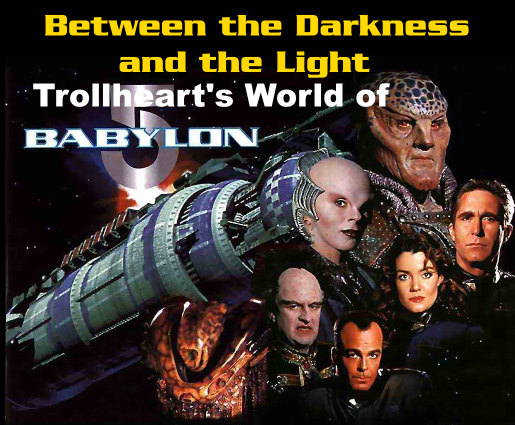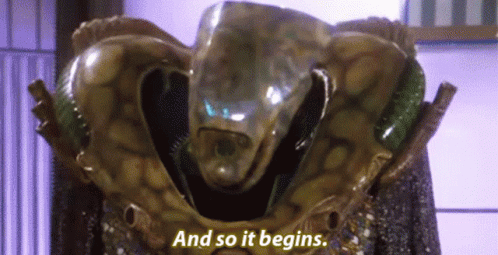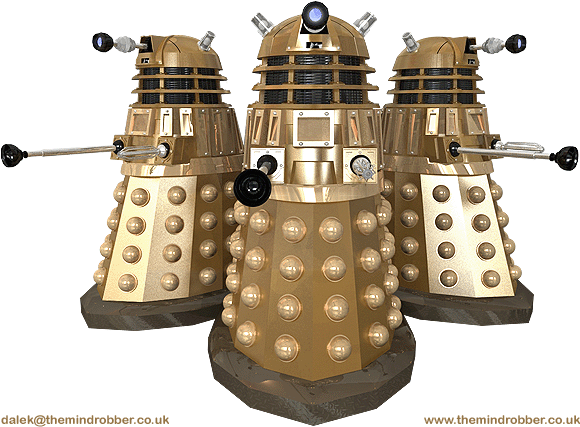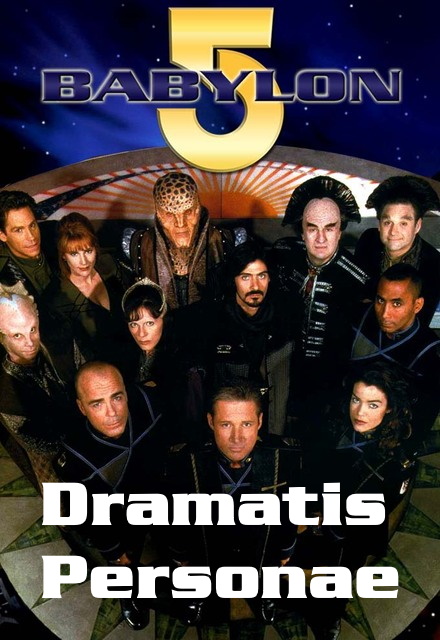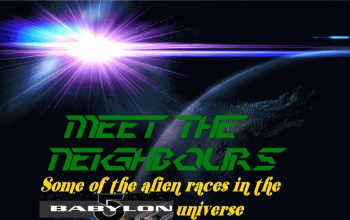
Rumours, bargains and lies:
The controversy over Babylon 5 and Star Trek: Deep Space 9
When Babylon 5 hit the air, there were a lot of comparisons made to the new Star Trek franchise, Deep Space 9, so much so that one has been constantly accused of stealing the ideas of the other. Given that JMS originally shopped Babylon 5 to Paramount months before they had even started writing Deep Space 9, and that he provided them with all the relevant information on his show (as he says himself, his “Bible”), and given that no other science fiction show, certainly no Star Trek show, had ever been set on a space station, it’s hard to discount the claims that Paramount stole Stracyznski’s ideas. Although he declined to take legal action against them, citing bad press for two fledgling shows, the controversy remains among fans of both shows. So let’s look into the case shall we?
Case for the Prosecution
JMS arrives at Paramount in 1989, a full year before Babylon 5 is picked up by Warner Bros and three before DS9 hit. JMS had given Paramount a full outline of the show, which apparently they held onto (according to Patricia Tallman, Lyta Alexander) for a year before returning it with a “thanks but we’ll pass.” One month before Babylon 5 was due to air lo and behold! Here comes the new Star Trek franchise, and like the two previous shows in that world it’s set on… a space station? Hold on: Star Trek doesn’t use space stations. They don’t crop up in either of the two series at all, except as waystations and refuelling depots, and are usually referred to as Starbases. But now, all of a sudden, when no science fiction show had featured a space station before (let me correct that: I’m sure if you trawl back you’ll find The Twilight Zone or The Outer Limits or one of those anthology shows may have had one in one story, but I mean an ongoing series that used a space station as its permanent and usual setting) Star Trek has one.
It’s hard not to scoff at the idea that Paramount did not copy Babylon 5, but it should also be noted that JMS has never blamed or made any sort of accusation towards the creators of Star Trek Deep Space 9, Michael Piller and Rick Berman, believing completely that neither had any hand in “copying” his show. Rather, he blames, or at least casts aspersions upon, the Paramount network executives, who had, after all, possession of his Babylon 5 scripts and the entire layout for over a year, during which time, if they were not interested in the idea of a show set on a space station, would you not expect the next Trek series to be on a starship as usual? So they liked the idea (but said they didn’t) but wanted it for themselves? As the man says in the Carlsberg ads, probably.
JMS himself has this to say on the subject (just one of many, many messages and exchanges he participated in during the show’s run and shortly after): “That we have decided – for the best interests of all – for the time being to take a mature, “let’s move forward” approach does not mean that I have to pretend nothing happened. Or shut my mouth about it. If there is any (to use your term) winking and nudging going on, it’s on the level of “Okay, YOU (Paramount) know what happened, and I know what happened, but let’s try to be grownup about it for now,” though I must say that the shapechanging thing nearly tipped me back over the edge again. If there are no more major similarities that crop up in the next few weeks or months, with luck we can continue that way.
Sometimes it does bother me, and I wonder about what the heck’s going on,when I see the only other space station series doing a big arc about alien forces infiltrating earth government, and brewing civil war on Earth, at the exact same moment that we’re doing it on our show; earlier, later, fine, but that they’d do basically the same thing at the same time feels like another attempt to co-opt what we’re doing on this show. (Not copy; co-opt, which happens all the time. Remember Deepstar Six? And another underwater monster movie released about the same time? Those were both direct attempt to co-opt The Abyss by coming out first. It happens all the time.”
There are issues there we’ll take and deal with, and I don’t agree with everything he’s said, but let’s for now go point by point and see where the two shows match up, and where they don’t.
Both shows are set on a space station. Both these space stations are military outposts, but crewed not only by military personnel. Both these military entities are based on Earth, and there is an Earthman (well, human - Sinclair was born on Mars) in command.
There is a commander in charge in both series. The commander is later replaced by a captain, though in the case of Babylon 5 this is not the same person, whereas in DS9 it is, a simple promotion. Slightly less of a case, when Captain John Sheridan is posted to Babylon 5 at the beginning of season 2, he is rather reluctant to take command and something of a fish out of water initially, mirroring the original attitude and position of Commander Benjamin Sisko.
Both stations have resident aliens on board. In Babylon 5’s case, mostly ambassadorial staff whereas on DS9 they are either part of the operational staff or work independently, such as Quark and Garak. In both cases, aliens are free to carry on business at the station, whether based there or passing through, as long as they follow the station rules.
Both shows feature a major, galaxy-spanning war from their third season on. Babylon 5’s war has been coming really since the pilot episode, and in fact it features essentially two wars, though the war with the Minbari is over by the time the series begins, whereas the war with the Shadows, which will draw in all races and lead to great destruction, is foreshadowed really only from about season two onwards.
Both stations have females as second in command, though the relationship between Sinclair and Ivanova - who are friends - is much easier than the initial one between Sisko and Kira.
Both series feature doctors of colour, though DS9 goes one better and gives command to an African-American.
Both stations have smaller craft to serve them, though in the case of Babylon 5 these are fighters (Starfurys) used to protect the base and engage in patrols, whereas on DS9 their “shuttlecraft” (Runabouts) though armed, are generally more for transportation than combat.
Both shows feature religion heavily, something no other science fiction show had done up to that point. DS9 pretty much focuses on one belief, that of the Bajoran “prophets”, who are seen to be, by Sisko when he meets them, aliens, and yet he does not try to convince their followers they are wrong to see them as gods. He’s also placed in the very unenviable position of being chosen by them as their messiah, their emissary, so has to balance being essentially a divine messenger with his job as rational, science-following Starfleet officer.
On the other hand, neither Sinclair nor Sheridan, initially, are necessarily involved in any of the religions in Babylon 5, of which there are probably as many as there are alien races, but none of which really truly impact the storyline as heavily as do the ones in Trek. Later, there is an sort of “emissary effect” with Sinclair, though this can in one way be said to predate that of Sisko, at least in terms of the show’s mythology. Unlike the commander of Deep Space 9, neither Sinclair nor Sheridan (at first) involved themselves in any of the religions.
Both shows are also very heavily political, another first. Babylon 5 concentrates mostly on Earth politics, mirroring a sort of Orwellian future from season two’s end to that of season four, whereas DS9 focuses mainly on Bajoran politics, and how they affect the station. Earth is seldom seen, hardly ever mentioned.
Both shows tend to have their characters dance on the head of a moral pin, where there are no real good or bad guys, and shades of light and dark persist. Both main - and other - characters have to do things that are opposite to their nature in order to attain the goal they need to.
Both shows have a powerful alien enemy/nemesis. Both are late to show up, with the Dominion only hinted at and then slowly coming in from the opening of season 3 of DS9, while the Shadows don’t make a proper appearance until early in season 2. Both alien races have the ultimate goal of controlling all other races
Both shows feature two alien races, one the but-recent oppressor of the other. On Bajor, the population have fought a long war of attrition against the Nazi-like Cardassians, who still hate them and think them inferior, whereas in Babylon 5 the Narns have been oppressed by the Centauri, who have the same lasting hatred for each other.
Both shows use the medium of hyperspace to travel long distances, however since Star Trek has long ago captured the market with its warp drive, JMS instead used “jumpgate technology”, making a sort of passage through hyperspace funnelled between two man-made jumpgates. In DS9, in addition to warp drive, there is the wormhole, a natural corridor which links two stable points at different quadrants in the galaxy, allowing all but instantaneous travel to places even starships would take time to get to. Pedantically speaking, both the wormhole and the jumpgate serve the same purpose, but in fairness, wormholes have been theorised about for decades, while jumpgates were at the time a totally new idea. I would imagine at the heart of this decision was the intention of the makers of DS9 not to be accused of copying the jumpgate idea, despite what else they were accused of.
The case for the defence
Deep Space 9 orbits a planet guarding a wormhole, Babylon 5 does not.
Many of DS9’s staff are alien, but on Babylon 5 they’re all human.
Babylon 5 used a telepath story arc, beginning with the dark and shadowy Psi Corps. Despite having a telepath in Deanna Troi in Star Trek: The Next Generation, DS9 did not use telepaths at all, and even in TNG they were not subject to or part of any Orwellian organisation.
Star Trek has had, from the days of the Original Series, personal transportation or teleportation (beaming up/down); Babylon 5 never had this technology.
With the odd exception, the main military power in DS9, Starfleet, is seen as benevolent and principled (even if it isn’t always), whereas Babylon 5 teaches an innate distrust of Earthgov, and the station and Earth exist in a kind of uneasy truce.
DS9 has its own bartender and casino, often the forum for many of its stories. Though there are bars and casinos on B5, they are never part of the story - unless very peripherally, like if people meet there - and there are no personalities associated with them.
DS9 has holosuites; Babylon 5 has nothing similar, in fact has little in the way of recreation for its officers, it would seem.
Babylon 5 dares to imagine the impending defeat of humanity. The only other series to do this (other than Battlestar Galactica) has been TNG, where the Borg kicked Starfleet’s arse at Wolf 359. For all its pretensions to equality, DS9 still portrays humanity - mostly through the agency of Starfleet - as the dominant power, and not only that, the one that should rightfully be dominant, a kind of human supremacy, if you will. Babylon 5 focuses very much more on the interaction between the alien races - Minbari, Centauri, Narn, Vorlons and so on - painting a much more realistic picture of a young race - ourselves - come late to the party, or in other words, newcomers joining the big boys in space. Why should we feel superior, it asks, when races out there have been exploring and conquering the galaxy millennia before our planet was even formed?
As is the nature of Star Trek in general, DS9 features more “away missions”, where the staff visit other planets, than Babylon 5, which, though we do see other planets - Minbar, Centauri Prime, Narn, Drazi Homeworld, Zha’dum - generally does not have the main characters go there. There really are no away missions.
Just to go back then to something JMS said in the quote above (you remember that, don’t you? It hasn’t been so long ago, has it?) when he referred to first a civil war being one of the things he believed DS9 copied or took inspiration from. Well, to be fair, I can’t remember any civil war in DS9. I mean, yes, Earth was for two episodes under martial law (“Home Front”/”Paradise Lost”) but that didn’t last and had no real long-term impact. Certainly was not a civil war. There was unrest and conflict on Bajor, but a civil war? I don’t think so. He also mentions “shapeshifters” that made him “go over the edge”. Why? Babylon 5 has none, unless you count that changeling net, and that was technology, and only used in the pilot episode, and to be fair, took its own inspiration from the idea of doppelgangers and shapeshifters in popular myths and fairy tales, so JMS could hardly claim that as an original idea.
As for the idea of “aliens infiltrating the government”, well again no. In DS9, the Changelings certainly did this, or tried to (although it amounted really to just one or two officials, and one of them Klingon, so what kind of was the point?) but not in Babylon 5. Did we see the Shadows try to replace people? No, we did not. Morden pulled strings and made alliances with certain high-ranking officials in Psi Corps, who in turn made their influence felt at the very highest levels of government (this government goes all the way up to the President!) but there was no direct Shadow involvement (hah! Shadow government!) so I think he’s being a bit nit-picky or overly sensitive there.
But he has many valid points, and before we wrap up, let’s look at the original main characters of each and see what, if any, similarities there are between them, and if one could be said to have influenced the other.
We begin then with Sisko v Sinclair (Sheridan came later, so as I don’t know if his character outline was presented to Paramount, let’s discount him for now).
Benjamin Sisko is an African-American officer in Starfleet, who, when we first meet him, was commander on board a starship at Wolf 359, where he lost his wife to the Borg attack. As a result, he is ready to leave Starfleet, resigning his commission, when he is presented with the post on Deep Space 9, at the time orbiting the quiet, backwater world of Bajor. He brings with him his young son. He is quiet spoken, honourable but bitter from his loss, and blames his commanding officer, Admiral Picard, as when captured by the Borg Picard, as Locutus, directed the attack on Starfleet. He knows Picard had no choice but can’t forgive him. His epiphany comes when he accidentally discovers the wormhole and meets the aliens the Bajorans know and worship as the Prophets, this making him an uneasy celebrity on Bajor and on the station, and also opening up a strategic advantage for Starfleet, as “custodians” of the wormhole. They now control access, through Deep Space 9, to the Gamma Quadrant of the galaxy.
Jeffrey Sinclair is Martian-born, a white man with no real ties (we see various half-stories with girlfriends but nothing comes of it), serving in Earthforce, and while he is not commanding a starship when we meet him, his successor (whom I know, I said I would ignore but I think this might be important) is, being transferred from the Agamemnon to run Babylon 5. Sinclair has however no real problem with Earthforce (though he does have recurring PTSD from his time on the Battle of the Line, and wonders what happened when he blacked out; coming to 24 hours later, the Minbari had surrendered on the cusp of victory) and we don’t see any higher-ranking officer talking to him. He is already in his post when we meet him, though not for that long, as in the pilot movie he is awaiting the last of the five alien ambassadors - Kosh, from Vorlon - in order for the station to officially go operational.
Verdict: In general, though both surnames begin with the same letter, I don’t see too many similarities here. In fact, I’ll list the differences I see.
Sisko: Married (widowed) with a son, of African descent, heavily involved in religion despite himself, reluctant to take up his new command. A commander when he begins, a captain later.
Sinclair: Single, no children, of caucasian descent though Mars-born. Not religious that we’re told, at least initially, no real problem with his command. Remains at the same rank until he is reassigned to Minbar at the beginning of season two.
Next we have Ivanova v Kira
Ivanova is human, of Russian descent, and, as we will find out later, a latent telepath. She is friends with Sinclair, has known him long before they both came to Babylon 5. She is, on the surface, cold, clinical, aloof. She has a great pride in her work and dislikes those who do not. Her father and mother are both dead, as is her brother. She tends to guard her emotions, and seldom shows any real feminine traits, as it were. Sometimes it’s a little hard to remember she is a woman.
Kira Nerys is Bajoran. She has no telepathic abilities, does become friends with Sisko but for a long time opposes him and sees his, and Starfleet’s, presence on Deep Space 9 as another occupying force, and unwelcome. Without checking back, I think her parents may be alive but her two brothers do appear to be. I could be wrong about that, I’m just going on my memory and basic Wiki research here. She however is not married, though she is romantically involved with two characters (not at the same time of course) and has no children. She is quick to anger (always seems to be angry), but loyal and proud, perhaps tipping over into arrogance. Like Ivanova, she does not exhibit the same sort of feminine traits or show her feelings as say Deanna Troi or Jadzia Dax, and can be quite mannish.
Verdict: More alike than unalike. Here we go again.
Neither are married. Neither have children. Both are shall we say a little more masculine in their outlook and behaviour. Both are perfectionists, but whereas one is a calculating, careful person (Ivanova) the other tends to be more fiery, going off half cocked as it were. Kira loses her temper easily and very loudly, Ivanova tends to use a tongue dripping ice and a withering look to register her displeasure, and seldom if ever raises her voice.
CHIEF OF SECURITY
Odo vs Garibaldi
There’s not much point in spending a lot of time here. There are clearly no similarities between these two. One is a shapeshifting alien who is vaguely amused and often dismayed by humans, and though, like Data, he sometimes tries to fit in, he never really does. He has an attraction to Kira but really does not understand human emotions sufficiently to act upon it until it is almost too late. Garibaldi is, I think at least part Irish, and served with Sinclair on Mars. He is a recovering alcoholic, and though he too lusts after one of the characters (Talia Winters) he’s not at all shy about proceeding, though his interest also ends in disaster.
Verdict: Nothing to see here, keep it movin’!
DOCTOR
Bashir v Franklin
Although the original doctor on Babylon 5 was Ben Kyle (perhaps the first name made it through to be given to that of the commander of Deep Space 9) the differences are a little superficial. Both Kyle and Franklin are of African heritage, Franklin belonging to some odd sect called Foundationists, presumably in honour of Asimov. He’s brilliant, dedicated to his work and like most doctors cocky as hell. He does not know Sinclair, but becomes friends with him (though more with Sheridan later) and is not in the first episode, only coming in for the second, “Soul Hunter”. He is later revealed to have a problem in that he is addicted to “stims”, medical stimulant injections which he uses to keep himself going, I guess like using steroids if you’re an athlete, or taking uppers to stay awake? Anyway, he’s single, has no children and his parents are alive. He eschewed what could have been a bright career to hitch-hike on starships so he could see the galaxy and ended up at Babylon 5, against his father’s wishes, he being a general in Earthforce. He did not join Earthforce and so is a civilian, though technically under the command of Sinclair.
Julian Bashir is young, gifted and incredibly cocky. He, too, is of African descent, also single and without issue. He is in the first episode, and unlike Franklin he holds a Starfleet rank (junior grade lieutenant). He falls almost immediately for Jadzia, but has little chance as she is not looking for a relationship, the trill within her many hundreds of years old already. Like Franklin, he too passed up many choice opportunities in order to get a posting at Deep Space 9, where he proudly calls “the frontier”, much to the annoyance of Sisko and Kira. Nothing is said of his religion, if he has one, but I think he may have mentioned somewhere along the line that he is an atheist. Don’t quote me now.
Verdict: There’s a lot of crossover here, and I think I would have to say that yes, on balance, Bashir could be loosely based on Franklin. Of course, later their characters diverge wildly, but on the surface, there’s enough there I believe to make the case.
It’s hard really to compare the other main characters. DS9 has no stationed ambassadors, certainly no alien ones, and four of them make up the rest of the main cast list on Babylon 5. I suppose in essence you could maybe - maybe, at a considerable stretch - compare Londo to Quark, if only in terms of let’s say temperament, drinking and enjoyment, but other than that, no. There’s no equivalent to Delenn, no copy of G’Kar (superficially, maybe Garak but it would only be in general appearance) and absolutely no corresponding entity to Kosh. Like I say, there are no telepaths on DS9 and without ambassadors there are certainly no attaches. There aren’t any religious figures in or on Babylon 5 (until G’Kar reluctantly becomes one later) and there’s no version of Psi Corps in DS9, so nobody like Bester.
One point where I feel JMS may have originally intended to pursue a storyline and then either changed his mind or decided to drop it in the face of a developing story on DS9 is with Section 31. In DS9, this is revealed to be a shadowy, black ops department that does all the things Starfleet is prohibited from doing, and in Babylon 5 there is one mention and one only of a similar organisation called, um, Bureau 13. Now, I read there is/was a game using this name already in existence, so JMS did the decent thing and dropped the name. However, Bureau 13, or whatever it was supposed to be renamed to, was never heard of again. Not even in passing. This leads me to believe that he decided to drop it and just fold the whole organisation into the larger and no doubt labyrinthine one of Psi Corps. It is interesting though that Star Trek decided to reverse the numbers and change Bureau to Section. I imagine that stung a bit, especially as they didn’t use it till season six. Hey, maybe it was coincidence. If you don’t agree, I’m sure Section 31 agents can arrange to visit you and see if they can change your mind.
So what in the end is the actual verdict? Well, as you might expect, the jury has been gone a long time now, and we kind of think they may have gone home, just given it up. There are arguments for and against, but mostly for the idea that at least areas of DS9 were, if not copied then at least inspired by Babylon 5. But both series did diverge from each other pretty sharply and each followed its own path, and in the end, we got two of the greatest shows recent science fiction TV has managed to produce, everyone stayed out of the courtroom (according to Patricia Tallman there was a lawsuit but it was settled out of court) and we were left with some amazing storylines, characters we’ll never forget and a fitting legacy for science fiction television.
Whatever the truth of the matter is, one thing remains certain: both shows helped shape the future not only of science fiction on television, but of drama itself. We will never see the likes of either of them again.
